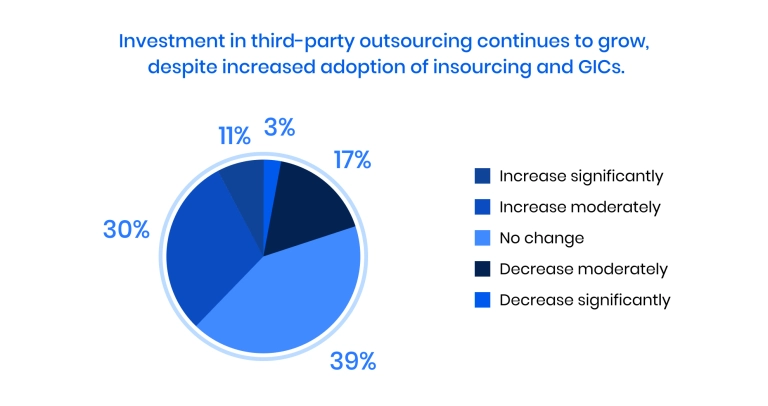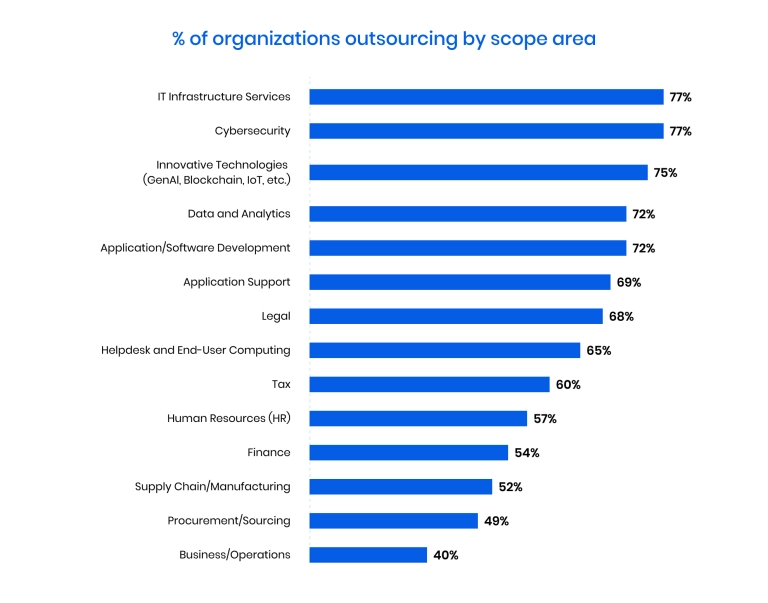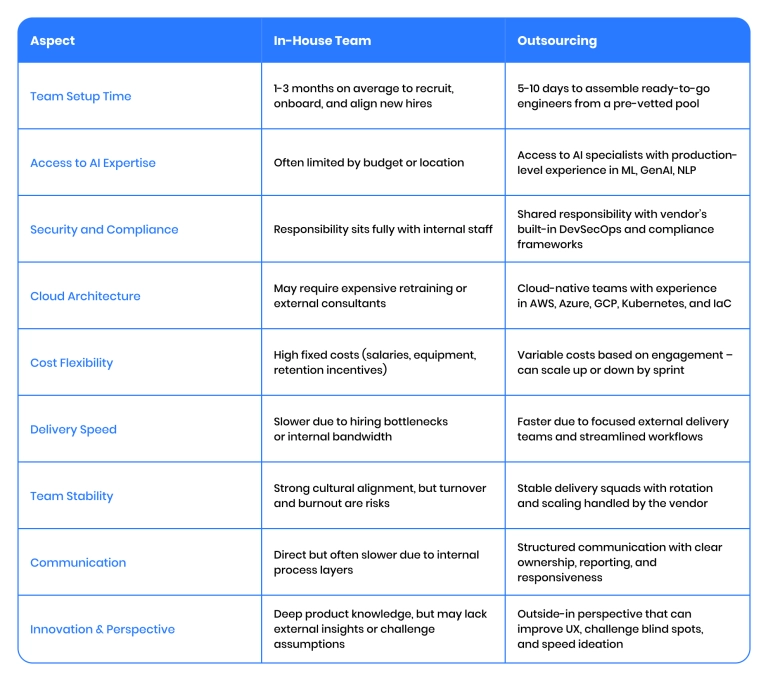Forget what you knew about outsourcing. In 2025, it's no longer just a cost-cutting tactic. Today, companies turn to software outsourcing to access niche expertise, scale faster, move with market demands, and stay compliant in complex regulatory environments. The advantages of software outsourcing now lie in its ability to bring strategic, long-term value to both midsize and enterprise businesses.
One of the key benefits of software outsourcing is the ability to access specialized talent in areas where in-house expertise is often limited or unavailable. According to Deloitte’s 2024 Global Outsourcing Survey, the most commonly outsourced domains include IT Infrastructure Services and Cybersecurity (77% each), followed closely by innovative technologies like GenAI, Blockchain, IoT (75%), and Data and Analytics (72%).


This shows a clear strategic shift toward outsourcing not just support functions but advanced capabilities critical to digital transformation. By working with external partners, companies can immediately tap into these high-demand skill sets without the delays and costs of internal hiring or training – ensuring faster delivery and greater flexibility.
What modern outsourcing really offers
In 2025, the benefits of software outsourcing extend far beyond cost savings. Strategic partnerships now empower businesses with specialized expertise, accelerated delivery, and robust compliance support.
Accelerated time-to-market
Reducing the time it takes to bring a product to market is a critical advantage. One of the significant benefits is the ability to expedite product development cycles.
According to a report by Grand View Research, the global IT outsourcing market was valued at approximately 6.6 billion in 2023 and is expected to grow at a compound annual growth rate (CAGR) of 7.7% from 2024 to 2030. This growth underscores the increasing reliance on outsourcing to accelerate development timelines and enhance operational efficiency.
By partnering with experienced outsourcing providers, companies can leverage specialized expertise, streamlined processes, and scalable resources to enhance their operations. This collaboration enables businesses to respond more swiftly to market demands, adapt to changing customer needs, and maintain a competitive edge.
Risk management and compliance: HIPAA, SOC 2, and beyond
Modern software development outsourcing is a strategic move to manage risk and meet stringent compliance requirements. For industries like healthcare and finance, partnering with vendors experienced in frameworks like HIPAA and SOC 2 is the key.
HIPAA compliance
Outsourcing partners with HIPAA expertise can help healthcare organizations avoid costly violations. A single HIPAA breach can result in fines of up to $1.5 million per year. By working with third-party assessors, companies gain impartial expertise, detailed reporting, and guidance that internal teams may lack.
SOC 2
Achieving SOC 2 compliance is a testament to an organization's commitment to data security and privacy. It involves rigorous evaluation of internal controls related to security, availability, processing integrity, confidentiality, and privacy. According to a recent article by Vanta , a completed SOC 2 report not only strengthens an organization's security posture but also demonstrates trust to stakeholders and drives business growth.
The new drivers behind software outsourcing in 2025
Today, companies no longer outsource just to cut costs – they do it to keep pace with shifting regulations, rising expectations in tech, and the need for flexibility. Whether it's launching AI products faster, staying compliant, or scaling without delay, outsourcing has become a strategic tool for staying competitive.
Security and compliance keep raising the bar
Regulations like GDPR, HIPAA, and SOC 2 are tightening every year, and now they come with more frequent audits and higher penalties. Keeping up requires constant monitoring, documentation, and technical enforcement.
One of the main advantages of IT outsourcing today is access to partners who've already built their operations around compliance. These vendors integrate risk controls into every stage of development, helping companies stay ahead of new rules without slowing down delivery.
AI talent is scarce – and in high demand
Since 2023, the rush to integrate AI has reshaped product roadmaps across nearly every industry. But finding in-house talent with real-world experience in generative AI, LLM fine-tuning, or scalable ML pipelines is still a major challenge.
Outsourcing enables companies to leverage specialized AI teams that have done this before, turning ambitious AI goals into working features – without the trial-and-error of building from scratch.
Cloud-native infrastructure has become the baseline
Few businesses can afford to stay on legacy stacks. Whether it's about reducing downtime, supporting global scale, or launching new products faster, cloud-native is now the default. But re-platforming isn't simple – it requires deep experience in DevOps, containers, and cloud architecture.
The benefits of outsourcing software development here are clear: access to engineers who have built production-grade systems in AWS, GCP, and Azure and can do it again quickly.
Speed and flexibility without long-term hiring
When product timelines tighten or funding windows open up, there's rarely time to go through months of recruiting. A dedicated development team provides you with skilled engineers who are already working as a cohesive unit, ready to deliver results immediately.
This model enables companies to grow rapidly or scale back if needed – all without the risks of overhiring or overstretching internal teams.
Boost your project with Binariks' dedicated development team
Why domain expertise matters more than ever
The gap between good software and usable software often lies in domain knowledge.
For regulated industries like healthcare, fintech, and insurance, it's not enough to write clean code – teams need to understand the rules, systems, and user behaviors that define the product space. Here is an example from the American Hospital Association Regulatory Overload Report : "Health systems, hospitals and PAC providers spend nearly $39 billion a year solely on the administrative activities related to regulatory compliance. Looked at in another way, regulatory burden costs $1,200 every time a patient is admitted to a hospital."
So, yes, it's quite complicated. One of the critical advantages of outsourcing software development is access to teams who've already built solutions in such industries. They know how to navigate HIPAA, PCI-DSS, or PSD2. They've worked with EHR systems, financial APIs, and insurance claim workflows. That experience saves weeks of onboarding and prevents costly rework in the future.
Without domain expertise, outsourced teams often:
- Build features that don't align with real workflows (e.g., clinicians, underwriters, traders);
- Miss key compliance details, delaying launch or triggering audits;
- Choose architectures that conflict with internal systems or legal requirements.
This is a major reason why companies outsource to partners with vertical experience. It's not just about building something fast — it's about building the right thing the first time.
At Binariks, our outsourcing services are grounded in industry knowledge. We bring teams who understand how regulation, UX, and infrastructure work together in real-world products.
When outsourcing software projects, domain fit isn't optional. It's the difference between a sprint that moves you forward and one that leaves you cleaning up after.
How strategic outsourcing supports flexibility and speed
Ask any mid-sized product team what slows them down – it's rarely the tech. It's hiring, resourcing, and figuring out how to move faster without breaking things. That's where smart software project outsourcing comes in. It's about making your team more responsive when time and headcount are tight.
- Scaling without the hiring delay
Building a new product? Just closed a funding round? You probably need more hands – now. With the right partner, you can scale up in a week. No job posts, no interviews, no notice periods. Just developers who know how to ship. This kind of flexibility is nearly impossible to match internally, especially when speed is non-negotiable.
- You get experts – not a hiring pipeline
Need someone who has already solved the problem you're facing? Outsourcing gives you that. Whether it's cloud architecture, mobile security, or backend performance, you skip the resume filter and go straight to someone who's done it before. That's one of the reasons software outsourcing projects often feel faster and more focused than in-house builds. You're buying outcomes, not resumes.
- Better delivery rhythm, especially for mid-sized teams
Mid-sized companies don't have the luxury of bloated teams or lengthy rebuild cycles. You need a lean delivery setup: one that knows how to plan, build, and adapt quickly. A good outsourcing team becomes an extension of yours – not just extra hands, but extra momentum. And in fast-moving industries like finance, fintech software outsourcing provides you with engineers who understand the urgency and the rules, so you're not wasting time explaining the basics.
Outsourcing isn't a shortcut. When done right, it doesn't slow you down. It gets you where you're going faster without burning out your core team.
Choosing the right outsourcing partner in 2025
In 2025, selecting an outsourcing partner goes beyond filling roles — it's about finding a team that aligns with your roadmap, shares accountability, and delivers at your pace.
With tighter compliance regulations, rising expectations for AI, and the demand for lean, cloud-native delivery, companies can't afford misalignment. You need more than just a portfolio; you need evidence of how a team collaborates, communicates, and maintains quality under pressure.
Here's what defines a reliable outsourcing partner in 2025:
- Proven AI capabilities
AI is now embedded in mainstream product development, both in features and in operations, analytics, and automation. A qualified outsourcing partner should have engineers who've built or deployed models in production, whether for fraud detection, medical diagnostics, or content generation. Ask how they handle model updates, edge cases, and evaluation. Their team should be comfortable integrating open-source tools and enterprise APIs, not just experimenting.
- Mature security and compliance practice
Every year, there is an increase in oversight, resulting in more audits, more penalties, and more documentation. Your outsourcing partner should be able to step into that space with confidence. That means running secure pipelines (DevSecOps), knowing how to handle encryption at rest and in transit, documenting access levels, and compliance with HIPAA, SOC 2, ISO 27001, and GDPR. Ask how they approach threat modeling. If their answer sounds vague or reactive, walk away.
- Cloud-native experience
Most teams don't have time to re-architect every service, but cloud-native partners can do this without disrupting operations. They should be fluent in designing containerized applications (Kubernetes), using infrastructure as code (Terraform, Pulumi), setting up autoscaling environments, and optimizing cloud costs across AWS, Azure, and GCP. A strong partner designs with observability, failover, and resilience built in.
- Structured delivery and communication
Ad hoc updates don't cut it anymore. Mid-size companies need predictable delivery: weekly sprint demos, shared backlogs, daily check-ins, and real-time feedback loops. A professional outsourcing team should provide a dedicated PM, business analyst, and clear processes for handling blockers, changes, and release coordination. Communication tools should be integrated into the workflow, such as Slack, Notion, Jira, and GitLab, instead of relying on email threads.
- Transparent engineering process
When you outsource, visibility replaces control. You don't need to micromanage, but you do need access. That means real-time Git visibility, architecture docs, testing coverage, code reviews, sprint goals, and retros. A good partner will give you dashboards, not summaries. They'll show you how work moves through the system and let you track quality over time.
In-house vs Outsourcing in 2025

Strategic outsourcing in 2025 involves more than just bandwidth; it focuses on integrating teams that enhance your delivery without hindering your progress.
When outsourcing IT projects, the right call upfront prevents months of cleanup later. Select partners who can demonstrate their working methods, not just showcase their completed projects.
From MVP to continuous evolution: Building long-term value
Shipping a product is just the beginning. What comes next – maintenance, iteration, and long-term growth – is where real value is built. At Binariks, we don't step away after launch. We stay involved, helping our clients transition from MVPs to fully scaled, stable platforms that continue to evolve.
Post-launch support that's structured, not reactive
After release, things move fast. Users provide feedback, edge cases may appear, and systems are tested under real-world load. Our post-launch support teams handle this phase with care, offering bug resolution, performance tuning, infrastructure scaling, and uptime monitoring from the very beginning. You're not left chasing down issues; we track and manage them with you.
Ongoing product development that keeps you ahead
Product roadmaps don't stop at v1. We help you plan for what's next: adding features, refining UX, expanding integrations, or rebuilding architecture as user needs evolve. Our delivery model is designed for continuity – the same team that helped you launch is there to support your next iteration. No handovers. No reset.
Long-term stability, updates, and support
We work with companies that think in years, not months. That means long-term SLAs, proactive tech updates, secure patching processes, and tiered support tailored to your growth stage. Whether it's preparing for a security audit, cloud cost optimization, or upgrading a legacy module, we're still by your side and still responsible.
How Binariks helps clients build secure, scalable, future-ready software
At Binariks, we are committed to long-term partnerships. Whether launching an MVP, rebuilding aging infrastructure, or scaling a platform to support new markets, our teams work as a true extension of yours.
We build with security in mind, design for growth, and stay involved through every phase, from the first release to the tenth iteration. Clients rely on us not just for engineering but for clarity, stability, and momentum when it matters most.
Let's talk about what you're building and how we can help you take it to the next level.
Share

